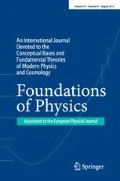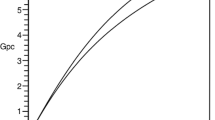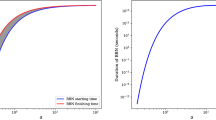Abstract
Recent computer simulations indicate that a system ofn gravitating masses breaks up, even when the total energy is negative. As a result, almost any initial phase-space distribution results in a universe that eventually expands under the Hubble law. Hence Hubble expansion implies little regarding an initial cosmic state. Especially it does not imply the singularly dense superpositioned state used in the big bang model.
Similar content being viewed by others
References
T. A. Agekyan and Zh. P. Anosova,Soviet Phys. Astr. 11 (1968).
R. S. Harrington,Celest. Mech. 9 (1974).
V. Szebehely and C. F. Peters,Astr. J. 72 (1967).
V. Szebehely,Astr. J. 79 (1974).
E. M. Standish, Jr.,Celest. Mech. 4 (1971).
E. M. Standish, Jr.,Astr. Astrophys. 21 (1972).
H. Pollard,Mathematical Introduction to Celestial Mechanics, Prentice-Hall, Englewood Cliffs, N.J. (1966).
C. W. Allen,Astrophysical Quantities, 3rd ed., Athlone Press, London (1963).
Author information
Authors and Affiliations
Rights and permissions
About this article
Cite this article
Allen, A.D. The big bang is not needed. Found Phys 6, 59–63 (1976). https://doi.org/10.1007/BF00708663
Received:
Issue Date:
DOI: https://doi.org/10.1007/BF00708663




